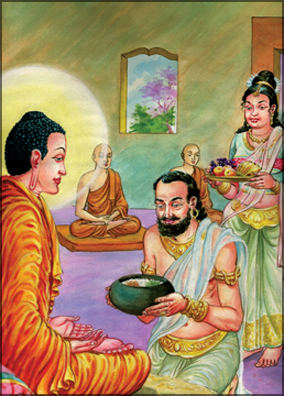‘Right Vision’ to ease fear and sorrow from Buddhism
Dr. Vidhura Mahendra
Money’ is the evil in our highly materialised modern day life. Some
say ‘Money talks’- especially the ‘new-rich’ segments of the society.
Money generates more money and that leads to vast sums of capital, and
dwelling on that scenario often brings us unhappy memories - leading to
sorrowful repercussions.
In recent history some Sri Lankans have experienced those
repercussions one way or the other. As the global economy taking a huge
tumble due to credit crunch in the western world and bad debts ‘money’
sadly has become a household commodity to discuss in our homes and at
coffee-breaks too. Economy often precedes spirituality and good social
living around the global arena.
In fact, currency is an essential component of our day to day lives
especially for comfort living and material acquisition (subsequently
socio-political power etc.) - not necessarily ‘the knowledge’
possession. ‘Money’ has often been badly interpreted and misused as a
factor by many opportunistic politicians to achieve an undue political
mileage, without substance, like the cycle of ‘samsara’ (cycle of
reincarnation). One must comprehend that the prevailing situation must
not be taken as a pretext to get opportunistic benefits.

It is a contemporary global trend and Sri Lanka is one of the
countries that may or will have been affected one way or the other. One
may easily become aware of that there will be no absolute change by just
switching over the driver of the same old car unless the car is fully
overhauled.
The Buddha has always mentioned the significance of following the
middle-path (Medum Piliwetha) journey to be successful. This is quite
appropriate for laypeople than ascetics who have families, relatives and
friends to care for backed up by further unwarranted external events to
be worried of. Most of the unwarranted external events may turn up in
the guise of monetary matters e.g. unsecured mortgage repayments,
housing loans and bad investments which all lead to some form of
psychosomatic effect among many folks.
This is further augmented by those who invest vast sums of wealth on
the anticipation of unprecedented returns often leading to comprehensive
debacles (collapses of financial institutions etc.).
As Buddhists some may perceive it is unforgivable or unthinkable as
to why this fact has not been comprehended in detail or is it that the
former are just uninformed to such affairs. The Noble Eightfold Path is,
in the teachings of the Buddha, declared to be the way that leads to the
cessation of suffering (dukkha) and the achievement of self-awakening
and is used as an instrument of discovery to gradually generate insights
unveiling the ultimate truth of things both materially and spiritually.
It is a technique used to eradicate greed, hatred and delusion.
The last of the four noble truths is the Noble Eightfold Path, while
the first factor of the Noble Eightfold Path is the understanding of the
Four Noble Truths. In all of the elements of the noble eightfold path,
the word ‘Right’ is a translation of the word samma (Pali), which
denotes completion, togetherness, and coherence, and which can also
carry the sense of ‘perfect’ or ‘ideal’. In Buddhist symbolism, the
Noble Eightfold Path is often represented by means of the Dharmachakra
(wheel of Dhamma), where the eight spokes represent the eight elements
of the path.
In Buddhism Meets Western Science, Gay Watson explains:
Buddhism has always been concerned with feelings, emotions,
sensations, and cognition. The Buddha points both to cognitive and
emotional causes of suffering. The emotional cause is desire and its
negative opposite, aversion. The cognitive cause is ignorance of the way
things truly occur, or of three marks of existence: that all things are
unsatisfactory, impermanent and without essential self.
The noble eightfold path is, from this psychological viewpoint, an
attempt to change patterns of thought and behaviour. It is for this
reason that the first element of the path is right understanding (samma-ditthi),
which is how one’s mind views the world.
Under the wisdom (pañña) subdivision of the noble eightfold path,
this world-view is intimately connected with the second element, right
thought (samma-sankappa), which concerns the patterns of thought and
intention that controls one’s actions. These elements can be seen at
work, for example, in the opening verses of the Dhammapada (Yamaka vagga):
Preceded by perception are mental states
for them is perception supreme,
from perception have they sprung.
If, with perception polluted, one speaks or acts,
thence suffering follows
as a wheel the draught ox’s foot.
Preceded by perception are mental states,
for them is perception supreme,
from perception have they sprung.
If, with tranquil perception, one speaks or acts,
thence ease follows
as a shadow that never departs.
Thus, by altering one’s distorted world-view, bringing out ‘tranquil
perception’ in the place of ‘perception polluted’, one is able to ease
suffering. Watson points this out from a psychological standpoint.
In fact, Watson’s view point articulately correlates to the present
day global credit crunch scenario and other financial woes from a highly
materialistic angle that many folks both home and overseas suffer from
with regards to Buddhist philosophy of ‘Right vision’, which has
ascribed to wise financial management that will ease the pains and
sorrows if one decides to take the middle path than be hell bent on
plethora of expectations upon financial impermanence.
Finally, it is apt to wind up on something the great philosopher
said,
Tanhaya jayati soko, tanhaya jayati bhayang,
tanhaya vippa muttassa, natti soko kuto bhayang
(Dhammapada, Priya vagga, 16:216)
From the craving springs grief, from the craving springs fear, and
for him who is noble and free from craving, there is neither grief nor
fear.
|



